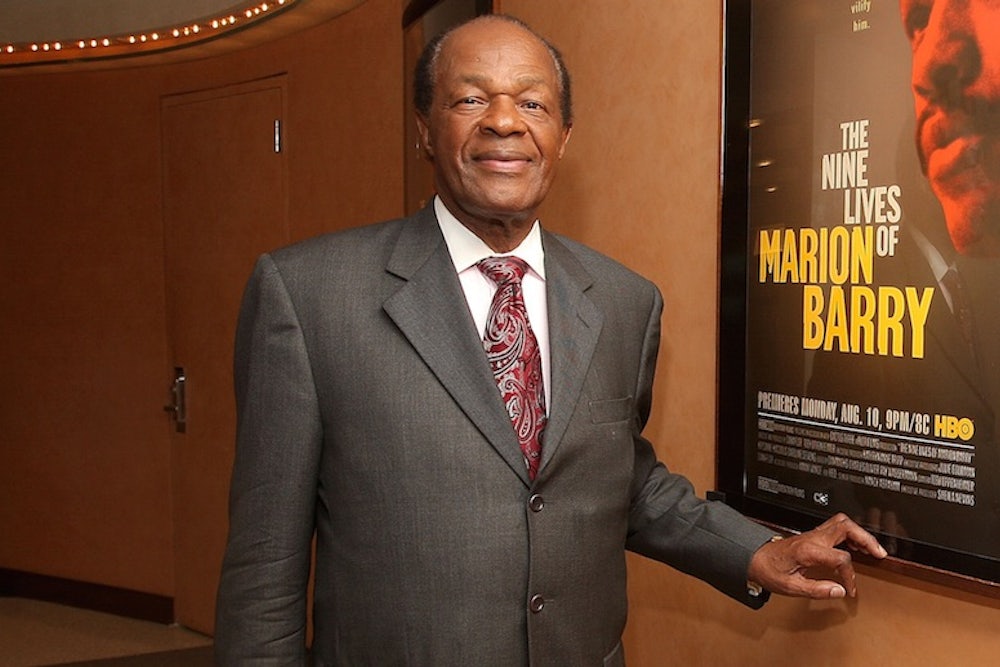Marion Barry was many things to many people—a hero, a scoundrel, a deeply flawed but ultimately admirable man, a tragic figure who snorted and screwed away his great potential. But for me, as a news- and politics-obsessed kid growing up in Washington, D.C., in the 1980s, Barry was first and foremost the greatest show on earth. So, while Barry’s death at the age of 78 is occasioning any number of tributes, condemnations, and assessments of the four-term mayor, I’d prefer to remember him as I originally encountered him: a spectacle.
In the 1980s in Washington, the local TV news was like TMZ, and Barry was its Miley Cyrus. Every day seemed to bring some new, hair-raising episode. There were Barry’s sudden and mysterious hospitalizations, episodes his office would blame on indigestion or a hiatal hernia flare-up but that everyone else suspected were drug-related. There were his strange disappearances, jetting off for an unannounced vacation to the Bahamas one weekend, traveling out to Southern California for the Super Bowl a few weeks later—and then staying there while, back east, D.C. was paralyzed by a massive blizzard. And, of course, there were Barry’s legendary nights on the town, when he’d disappear into night clubs and onto yachts, surrounded by women who weren’t his wife and men who probably weren’t offering policy advice. When it seemed like all of this was about to catch up to Barry, and a local newsman would ask him whether the city would be better off without him at its helm, the mayor never failed to disappoint with his response. Once, when a reporter inquired as to whether Barry was worried that Jesse Jackson might run against him, Barry simply replied: “Jesse don’t wanna run nothing but his mouth.”
I didn’t just watch the Marion Barry show on TV. I occasionally saw it live and in person. My friends who participated in Barry’s vaunted summer jobs program regaled me with stories of how they’d show up at some city government office at 9:00 a.m., write their names on a sign-in sheet, and then head to the pool or the basketball courts for the day, only to return to the office at 5:00 p.m. to sign out. On Fridays they’d come back to the office at 4:45 in order to pick up their checks. Meanwhile, our neighbor was an African-American man whose family owned a local motel that, during segregation, catered to the city’s black elite and visiting black dignitaries like Martin Luther King. After the civil rights movement succeeded in integrating the city’s lodging establishments, our neighbor’s motel fell out of favor and eventually became a fleabag. Enter Barry, who gave our neighbor, a political supporter, a city contract to house D.C.’s homeless at a four-star rate. Before long, our neighbor was driving a cream-colored Rolls Royce and putting a new wing on his house. At one point my family played a role in the TMZ-like coverage of Barry when a local news crew invaded our second floor so it could film what appeared to be city government workers installing what appeared to be city parks and recreation playground equipment in our neighbor’s backyard.
Of course, the greatest episode of the Marion Barry Show came in 1990, when he was caught on a FBI-operated surveillance camera smoking crack in a hotel room with a girlfriend and then being led away in handcuffs muttering, “Bitch set me up.” His subsequent trial only heightened the drama. One morning, I took a day off from my summer job (one, alas, that I actually had to work at since it wasn’t through Barry’s program) and took advantage of my new driver’s license to drive down to the D.C. courthouse at 4 o’clock in the morning to get in line to attend that day’s session. I don’t remember much of what occurred inside the courtroom, but outside the courthouse, on the pavilion that became known as “Barry Beach,” it was a circus like I’d never seen. Louis Farrakhan’s Nation of Islam security guards handled crowd control. George Stallings, an excommunicated Catholic priest who’d become Barry’s spiritual advisor, led some sort of prayer circle. And Sam Donaldson tried to interview Al Sharpton about Colin Powell while being harassed by the RC Cola Lady—a woman who dressed in head-to-toe blue spandex and balanced 2-liter bottle of said soda on her braided head and was very eager for her own 15 minutes of fame. After Sharpton had denounced Powell as an “Uncle Tom” for the third time to Donaldson, only to have the shot ruined yet again by the RC Cola Lady, the newsman and the minister agreed to meet up later. And at the center of the circus, conspicuously silent on the advice of his attorney, was Barry—a Barnum-like figure in an expensive suit with a kente-cloth scarf draped around his neck.
I recall all this now not to belittle Barry, nor to demean him. He was no more of a scoundrel, after all, than James Michael Curley or Richard Daley or any of the other white ethnic mayors who governed important American cities in the twentieth century. But I only experienced those larger-than-life politicians in the pages of history books. Barry was the one I was able to see live and in living color. It was a show I’ll never forget.
